Volunteer Monitoring During COVID-19
COVID-19 has changed the world. Guidance of the Center for Disease Control, the World Health Organization, and State and Federal governments should drive all volunteer water monitoring and community science program efforts. Nonetheless, many questions remain of what may be suitable steps for programs to take as stay at home orders are eased. This page will be used to share ideas and resources generated by practitioners from across the volunteer monitoring network, the broader field of citizen science, and beyond. The information and links shared on this page are meant to help people to understand what ideas, plans and resources others have across this broad network of programs, and to broaden our ability to communicate with one another across geographies.
Webinars:
September 29, 2020, 4-5:30 PM Webinar: Potential Presence of and Risks from COVID-19 in Water
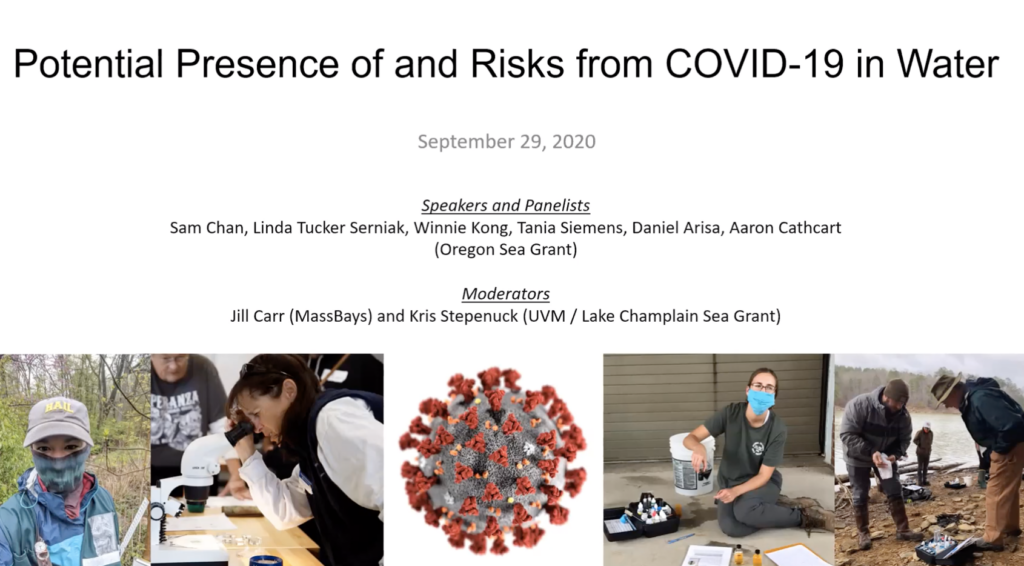
While some people may not have considered the potential presence for and risks from COVID-19 for people working or recreating along, on, or near lakes, rivers, estuaries and oceans, there is great concern among Extension educators, research administrators, and volunteer water monitoring coordinators on what is known, uncertain and unknown about the potential for risks from COVID-19 in the water environment.
A team of researchers from Oregon Sea Grant including Sam Chan, Linda Serniak Tucker, Winnie Kong, and Daniel Arisa will present findings from their research to inform a discussion on conditions that could lead to a higher risk from SARS-CoV-2 Coronavirus (COVID-19) in coastal (lakes, rivers, estuaries and oceans) waters and their implications for prevention when working or recreating near or in the coastal water environment.
They will provide an overview on key issues, research findings, knowledge gaps, emerging opportunities (e.g., wastewater surveillance) to date, and will highlight some examples of outreach being done by different organizations on COVID-19 in coastal water environments.
During the webinar, they hope to stimulate discussions on priority needs and areas, and to tap existing areas of strength (e.g., water quality monitoring and outreach on E. coli, parasite and toxin alerts for beach closure and shell-fish consumption) for collaborative Extension outreach programming and research relevant to water Extension and Sea Grant.
August 10, 2020 Webinar: Science Storytelling in the Digital Age
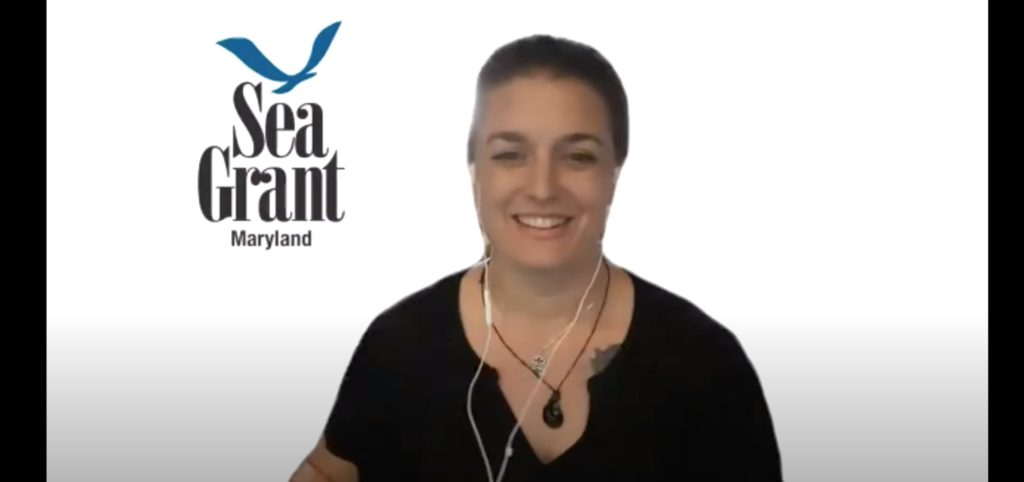
Following the April 21, 2020 webinar, a survey of participants revealed that professional development related to providing online education was desired by many. Lisa Tossey, Assistant Director of Communications and Outreach with Maryland Sea Grant College Program, shared her expertise in a presentation called Science Storytelling in the Digital Age. She described the presentation in the following way:
“Science communication can suffer from numerous pitfalls including jargon, complexity, a general lack of science education of the audience, and short attention spans. However, one of the most engaging ways to avoid these and connect with others about your science is by using basic storytelling techniques. And these days, you can literally immerse your audience in your work and make the experience fun by embracing innovative approaches using emerging digital technologies – both in capturing and sharing your work!
It’s getting easier and easier to capture quality footage outdoors and on the go with high definition cameras being built into every smartphone – and sharing information is easier than ever thanks to social media and digital storytelling platforms. We’ll take a look at the basics for capturing and sharing interesting imagery and footage of your work that will be engaging for your audience and cover what digital tools and online platforms may the best choice for your program to use to engage others and build awareness of the work you’re doing. We’ll also take a look at how to set-up and promote specific hashtags for your participants to use during your program or event so that you can easily compile them into a professional looking collaborative story that’s simple to share.”
- Webinar recording
- Webinar slides
- Science Storytelling resources curated by Lisa Tossey
July 8, 2020 Webinar: Panel Discussion: Offering Volunteer Trainings During COVID
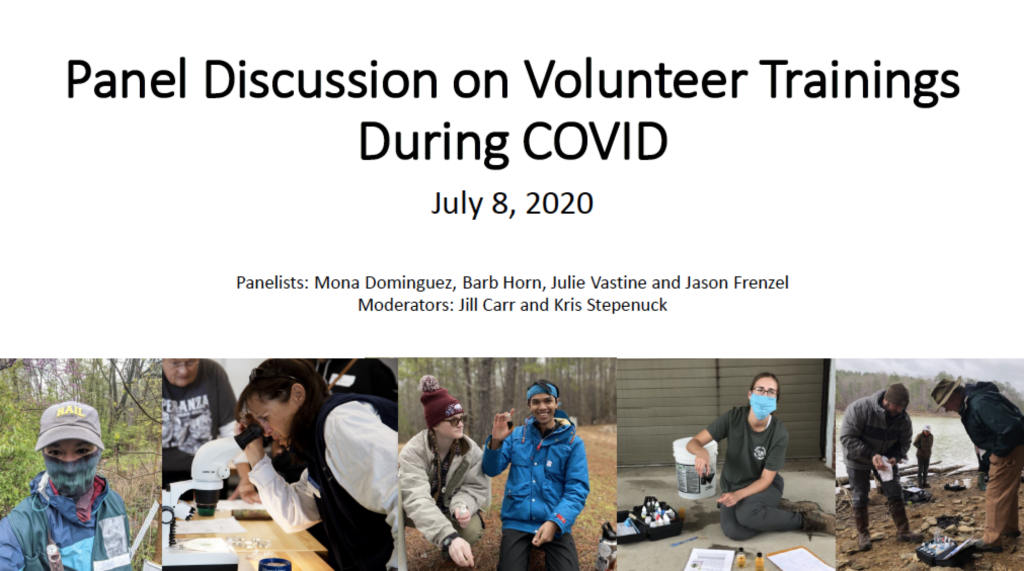
In response to a follow up survey from the April 21 webinar (see below), Jill Carr and Kris Stepenuck hosted a panel discussion with four veteran volunteer monitoring program directors who have held and/or who were planning additional volunteer trainings during COVID. They each described their trainings, and shared advice they have from challenges and successes they faced. These lightning round-style presentations were followed by a question and answer session. Speakers were:
- Mona Dominguez, Program Director, Alabama Water Watch, Auburn University
- Julie Vastine, Director, Alliance for Aquatic Resource Monitoring (ALLARM), Dickinson College
- Barb Horn, Water Resource Specialist, River Watch of Colorado, Colorado Parks and Wildlife
- Jason Frenzel, Volunteer and Stewardship Coordinator, Huron River Watershed Council
- Webinar recording
- Webinar slides
- Chat summary
- Resources (Google spreadsheet started for April webinar, and added to over time, including with resources mentioned during this webinar)
June 3, 2020 Webinar: Volunteer Field Work Town Hall
This webinar was hosted by the Citizen Science Association.
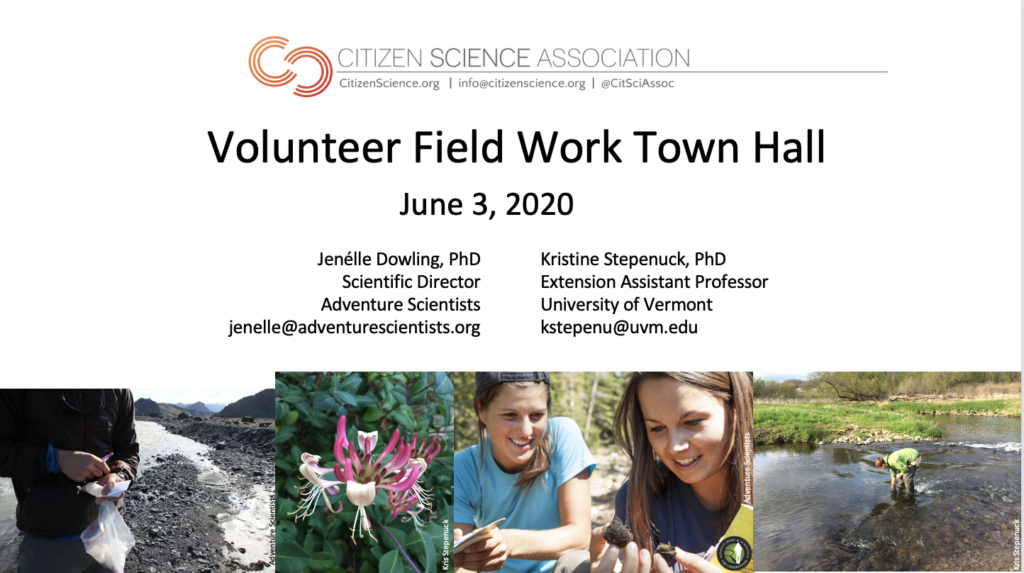
Speakers:
Jenelle Dowling, PhD, Scientific Director, Adventure Scientists
Kristine Stepenuck, PhD, Extension Assistant Professor, University of Vermont
Overview: Kris shared a summary of ideas that were generated from the April 21 webinar (see below) and early results of a survey of those who participated in that webinar to help webinar participants understand what modifications or decisions programs have made about volunteer water monitoring programs’ field seasons, and impacts of COVID. Jenélle then shared a case study from Adventure Scientists as an example with more in-depth information about decisions made and actions taken to train and engage volunteers safely. The session closed with an open town-hall-style question and answer session.
- Webinar recording
- Webinar slides
- Google spreadsheet (same as the one linked below)
April 21, 2020 Webinar: Citizen-based Aquatic Field Sampling in the Time of COVID-19
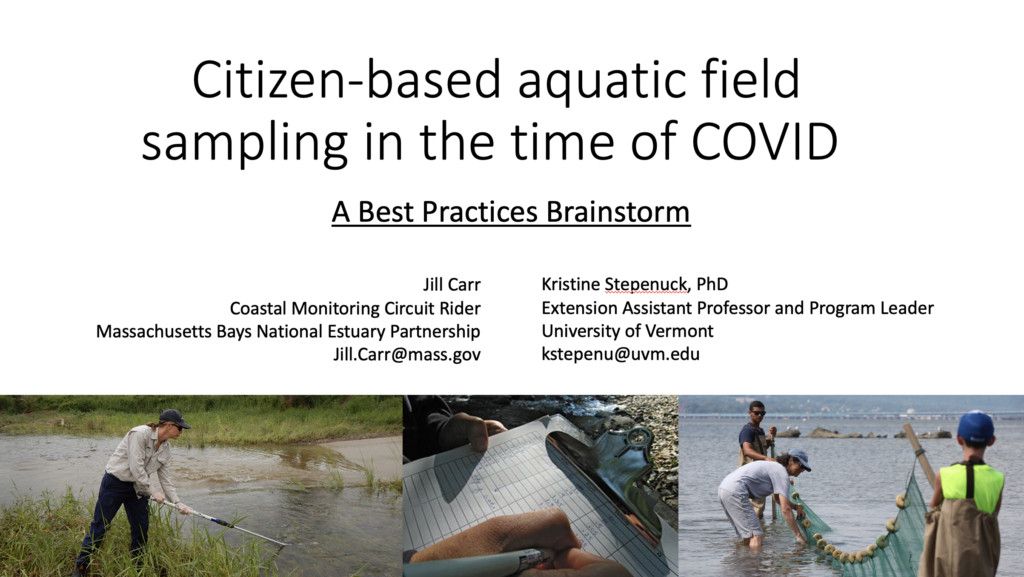
Jill Carr, with MassBays National Estuary Partnership and Kris Stepenuck, with the University of Vermont, Lake Champlain Sea Grant and UVM Extension hosted the following webinar on April 21, 2020.
The webinar provided an overview of planned actions from several volunteer water monitoring programs, and participants co-developed the Google spreadsheet to include tips to keep volunteers and staff safe, and resources from a variety of programs and organizations. This spreadsheet has continued to be updated through the 2020 spring and summer as new materials and resources have become available.
- Webinar recording
- Webinar slides
- Best Practices – Summary Suggestions
- Chat Summary
- Google spreadsheet with both ideas and links to numerous resources for planning and implementing volunteer water monitoring and aquatic citizen-based monitoring programs in 2020.